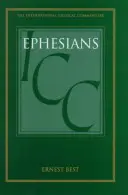

Ephesians
in International Critical Commentary
Collections
This book appears in the following featured collections.
- Favorite Advanced NT Commentaries by Jeremy Pierce (parableman)
- Ultimate Commentary Collection: NT Technical by John Glynn
- Essential Pauline Commentaries by Marcus Maher
- Building an NT Commentary Library by Invitation to Biblical Interpretation (Kostenberger & Patterson)
- The Pastor’s Bookshelf by Scot McKnight
- New Testament Commentaries & Monographs by Princeton Theological Seminary
- Recommended New Testament Commentaries for Evangelical Pastors by Thomas R. Schreiner
Reviews
Things I liked:
The key to a top notch academic commentary is fairness to opposing views. While not afraid to dismiss irrelevant views, Best does fairly represent his opponents and attempts to show (mainly through grammatical arguments) why their view is, in his opinion, defective. His commentary often proved to be a refreshing corrective to some of the overblown analysis of Lincoln, who sees preformed material seemingly in every section.
Best showed the structure of each section in his translation to help the reader clearly see Paul’s (or AE’s as Best likes to put it) flow of thought. This was very helpful as a quick reference when doing my exegesis. The rest of the commentary served as a defense of the translation and diagram. I also enjoyed his witty writing style. I even found myself chuckling at the way he would phrase things sometimes.
Best almost always takes the plain sense of the text, even when he doesn’t like the conclusions. This is especially clear in his discussion of the household code. In particular, I found Best’s analysis of chapters 1-4 to be very insightful. His arguments were clear and often persuasive. Particularly excellent were his discussions of the spiritual powers that are mentioned from time to time in Ephesians. I also liked his analysis of 2:1-10. I think he gives the best one sentence summary of the section that I have read when he says, “The new position of believers is a result only of the nature and activity of God.”
Criticisms:
Evangelicals will be bothered by his approach to chapters 5 and 6. He borders on contempt for the text at times, especially when he disagrees with it or finds it lacking, which is often.
While mounting as formidable a case as is possible, his argument against Pauline authorship is inadequate. He must be credited though with avoiding the specious argument of dependence of Ephesians on Colossians (or vice versa) and using the criteria of hapax legomena for determining authorship. Still, his insistence (along with many other scholars) on the existence of a Pauline school is baffling, and the differences in vocabulary, content, and style are not as significant as Best seems to believe. See O’Brien and Hoehner for outstanding defenses of Pauline authorship.
Overall Evaluation:
We have come to expect excellence from the International Critical Commentary and this commentary meets those expectations. It is the work of a careful scholar who labored over Ephesians for decade after decade. It provides a wealth of information that would benefit anyone doing a thorough study of Ephesians who knows at least a little bit of Greek. The commentary is overly critical at times, but that is not surprising given the series it’s in. I rate it four stars out of five.






